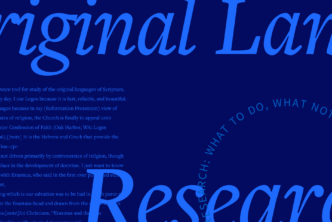The book of Genesis does what preachers and Sunday school teachers would do well to avoid. Indeed, it violates the first rule they teach you at Bible-teaching school: Don’t comment on the physical appearance of particular women. It’s okay for Genesis, of course, because the words of Moses here are divinely inspired, they form a key plot point, and the women are not in the room. But listen for the one odd figure of speech Moses uses in this litany of feminine pulchritude (or the lack thereof):
Now Laban had two daughters. The name of the older was Leah, and the name of the younger was Rachel. Leah’s eyes were weak, but Rachel was beautiful in form and appearance.
(Gen 29:16–17 ESV, emphasis added)
“Leah’s eyes were weak.” What does that mean?
I’ve puzzled over this phrase since I was a kid. I did get at least as far as Genesis 29 as an elementary schooler in my somewhat desultory attempts at Bible reading. The King James Version that I grew up on has the even odder phrase, “Leah was tender eyed.” I sort of thought tender eyes were a good thing, not something that needs to be set in contrast to the beauty of one’s sister. This is what “tender eyes” meant to me in my childhood (see rabbit on left):

Again: what does this odd phrase mean?
Idioms
Whatever the Hebrew says—and we’ll get to that all-important point—the English translations seem to me to be a bit uncertain what to say. Several, including the well-regarded CSB, stick with the KJV’s “tender.” But others try a different tack, with “weak” being probably the most popular choice (NIV, ESV, NASB). The NLT opts for “There was no sparkle in Leah’s eyes.” And two translations (NRSV, GNT) actually see the word as positive, translating it as “lovely.” So who’s right?

When you see translations differ this much, you’re probably dealing with a genuine ambiguity or obscurity in the Hebrew. And when you see them differ on an apparent figure of speech, you’re probably dealing with a Hebrew idiom: “A fairly fixed speech form or expression that cannot be understood grammatically from its constituents parts but whose elements function as a set with a meaning peculiar to itself” (Pocket Dictionary for the Study of New Testament Greek). In other words, just as pulling someone else’s leg generally involves no pulling and no legs, “weak eyes” very possibly involved no weakness and no eyes. It may have been, then, a delicate way of referring to something else about Leah’s physical appearance entirely. Certainly, to my mind, the strictly literal meaning of the phrase doesn’t work: it seems vanishingly unlikely that Moses paused here in Genesis 29 to make an observation about Leah’s need for an optometrist. The only thing “weak eyes” can mean, in context, is that Leah was less physically attractive than Rachel. “Leah’s eyes were weak, but Rachel was beautiful.” This verse sets up a contrast, and as in all language, so in the Bible: you interpret the unclear in light of the clear.
This is how far I got on my own. But I, of course, also turned to that glorious army, the commentators.
That glorious army
I was surprised to find that several excellent commentators reading the phrase positively, as a reference to the beauty of Leah. Hamilton (NICOT) concluded that the phrase at issue here is a positive reference to something “tender” or “delicate” in Leah’s appearance. She had beautiful eyes, in other words, but Rachel had more than just good eyes: she was easy on the eyes.
Kidner (TOTC) and Wenham (WBC), both of whom I greatly respect, also came up with a view I admit I did not expect. They do indeed take the phrase more literally. Leah’s eyes, in their views, were either weak in power or color (Kidner) or in sparkle or fire (Wenham). Perhaps having poor eyesight was itself considered unattractive in Jacob’s day? Perhaps she just looked listless, dull? To add to the big name parade, Waltke agrees with Wenham. And Wenham sees this as the majority view among commentators: Leah’s eyes had no sparkle. This fits just fine with the traditional KJV rendering of “tender,” which could be positive or negative.
Mathews (NAC), however, lands where I did:
The tenor of the passage, however, contrasts Leah and Rachel, first their order of birth and perhaps here their charm. This suggests that the term has the negative nuance of feeble, impotent.
That’s how far the commentators got me.
What to do when commentators send forth an uncertain sound
The whole reason I look at commentaries is that I need help, so I tend to turn to them when I’m uncertain of the meaning of a given passage. And if I’m uncertain, I find, often enough so are they—taken collectively, that is. They send forth an uncertain sound. I own hundreds of commentaries, though, because they do answer some questions definitively for me. And they rule out some bad ideas that occur to me (or to others). And they tend to sharpen up my vision of the question I’m pursuing.
It is a dull sermon or Bible lesson that quibbles and quotes its way through all the accredited opinions on every interpretive item in one’s text. But it’s an arrogant Bible teacher who doesn’t care to listen to skillful teachers. Take that attitude, and you may find that people turn it on you.
I’ll never forget a key piece of wisdom from the long-time WORLD Magazine columnist Andrée Seu Peterson. She was talking about the complex issue of headcoverings in 1 Corinthians 11:
I appreciate scholarship, but it is rarely conclusive. The question is this: When push comes to shove, do I go with Christian peer pressure or with God’s Word as I see it? All my obediences to received practice are suspect when I balk at the one point where conscience makes a contrary demand. It’s when there is disjunction that my true allegiance shows.
There’s nothing to obey or disobey in Genesis 29:17. The stakes are low. But in this age, before that day when we will know even as also we are known (1 Cor 13:12), before we are given authoritative interpretations straight from the Author of Scripture, there is some necessary here-I-stand Martin Luthering that must remain in the blood of every Christian. You have to earn the right to your opinion, of course. It’s here-I-grandstand if you don’t first listen to a representative sampling of careful Bible teachers and scholars (this is what I use Logos to do all the time). But in the end, after prayer and effort, I think you need to hope for and achieve some kind of interpretive resolution if at all possible.
I try to walk down the middle of this road. I listen to the teachers, but I have to teach the text as I see it. I can do no other. When there is particular difficulty regarding a certain interpretation, I may offer some hedging, or I may walk listeners through some of the interpretive options. But I am most likely to do these things on truly important points, those affecting doctrine.
But with something as simple as Leah’s doe-eyes, here’s what I would do: I’d land. I’d land without telling everybody where I’d flown. I’d stick with the intuitive—to me—opposition the text sets up, in which “weak eyes” are contrasted with Rachel’s beauty. And I’d appeal back to my gut feeling as someone who loves and knows language; I’d explain the text as an idiom communicating, in a delicate way, that Leah wasn’t quite the looker Rachel was.
(Another piece of what I hope to be wisdom: if you are indeed a preacher or Bible teacher, and if you happen to know that a majority of your hearers for a given lesson or sermon are carrying a translation that takes one side or the other, it’s generally best to stick with that side. Disagree as little as possible with the translations in your people’s laps.)
It can be frustrating as a Bible interpreter to have to land on ground you know is a bit unstable. But it’s our job as readers to whom Christ may say one day, “Have you not read …?” And it’s our job as heralds—those of us who are heralds—to do our best to repeat the message the King wrote down for distribution in his realm.
***
Commentaries referenced (+ other popular selections)
The Book of Genesis, 2 vols. (New International Commentary on the Old Testament | NICOT)
Regular price: $81.99
The Expositor’s Bible Commentary, Volume 2: Genesis, Exodus, Leviticus, Numbers (EBC)
Regular price: $30.99
Related articles
- The Best Bible Translations: All You Need to Know & How to Choose
- 7 of the Best Exegetical Bible Commentaries
- How to Do a Bible Word Study
- How to Do an Inductive Bible Study
- How to Study the Bible: 9 Tips to Get More Out of Your Study






